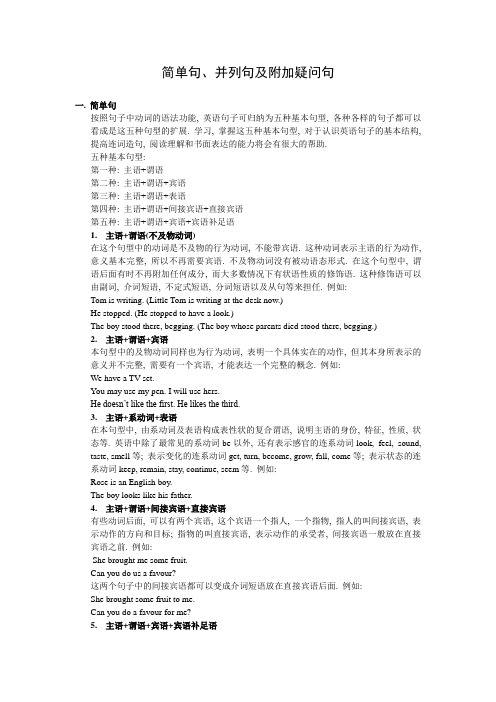高中英语语法讲义 ——简单句
简单句 高考英语语法重点归纳

十、简单句1、简单句的特点:简单句通常只由一个主语(或并列主语)和一个谓语(或并列谓语)构成。
2、简单句的种类:简单句一般分为陈述句、疑问句、感叹句和祈使句四种。
3、陈述句:用来说明一个事实的句子叫陈述句。
它有肯定式和否定式两种形式。
▲陈述句的肯定式:He is a middle school student.(他是个中学生)/ I have a hammer in my hand.(我手上有把锤子)/ She teaches us geography.(她教我们地理)/ The new play was good enough and everybody enjoyed it.(新的话剧非常好大家都喜欢)▲陈述句的否定式:1)谓语动词如果是be 、助动词、情态动词时,在它们的后面加“not”。
如:My brotheris not a teacher.(我的弟弟不是教师)/ He does not have a cousin.(他没有堂兄弟)/ I will not go there tomorrow.(明天我不去那儿)/ My mother is not cooking a meal inthe kitchen.(我母亲现在不在厨房里做饭)/ You must not make such mistakes again.(你不该再犯类似错误了)/ We haven’t discussed the question yet(我们还没有讨论那个问题呢).2)谓语动词如果没有上述词语而是其他动词时,须在它的前面加do not(don’t).如:Idon’t know anything about it.(此事我一无所知) / Li Ming does not feed pigs in thecountryside.(李明不在农村养猪)/ We didn’t expect to meet her right here.(我们没指望着在这里见到她)/ We didn’t have a meeting yesterday afternoon.(昨天下午我们没有开会)3)如果“have”作“有”讲,也可以在它后面加not构成否定式,其形式与have got的否定式相同。
高中英语精品课件 简单句五大基本句型(共36张)

1 仅仅使用主谓宾无法说明完整句意 必须添加补足语补充说明宾语情况 判断标准是在DO和OC中间可否加be动词
可接名词宾补的动词有call/elect/name/find…
I make him
DO
angry
OC
就是是否存在
逻辑上的主系表关系
He
is
此处为 形容词宾补
主 +谓 + 宾+宾补句型 简称 主谓宾补
It is
S S
lovely.
It looks strong.
V P(表语)
linking verbs(系动词)
表语:表示主 语是什么(身 份)或者怎么 样(处于什么 状态)
become / turn / get / grow / …变得
Predicative
表语
系动词
必须是这三类专门的词,而且必须表达这个特殊 的含义时才是系动词。 常见的连系动词 1.表示感觉的动词5个---翻译为 …起来 feel感到 excited; smell good; taste delicious; sound interesting; look happy 2.表示变化的动词:有固定的搭配 get smaller; grow older; become stronger; turn yellow; go bad; come true 3.表示状态保持的动词: stay healthy; keep warm; remain保持 be (am,is.are,was,were)是 ;seem似乎
1 The man is in the park.
2 He looks kind.
lv lv
lv
P(介词短语)
3 He is a kind man. 4 The singing of birds sounds beautiful.
英语基础语法讲解简单句终版.ppt

及物动词 (vt) 后面必须跟宾语意义才完整的实义动词。 vt后面可以直接跟宾语。
有不少的动词既是及物动词又是不及物动词。区别在于它所表示的含义有所
不同。
e.g. beat vi.跳动 vt. 敲、打; play vi.玩耍 vt. 打(牌、球),演奏 ring vi.(电话、铃)响vt.打电话 speak vi.讲话 vt. 说(语言)
• Her father bought her a dictionary as a birthday present.她爸爸给她买了一本词典作为生日礼物。
• The old man always tells the children stories about the heroes in the Long March.老人经常给孩子们讲述长征 途中那些英雄的故事。
can/ could/ must/ may/ might/ ought
to 情
态
可作情态动词,也可
动 2 作实义动词
need/ dare
词
3
可 作 情态动词 , 也可 shall/ should/ will/
作助动词
would
4 勉强可作情态动词
have to/ had better/ used to
.,.,
8
基本句型二:主+谓+宾
• 主语+及物谓语动词+宾语
• 可充当宾语的有名词、代词、数词、不定 式、V-ing 结构及名词性从句
• e.g. I watch TV every night.
• S vt. O
• We accepted their advice.
•
S vt.
O
2024届高考英语复习:简单句主谓宾结构详解讲义

高考英语复习:简单句主谓宾结构详解讲义1)高考英语简单句主谓宾结构详解高考英语中,简单句的主谓宾结构是一个基础且重要的语法点。
下面,我将详细解释主谓宾结构的知识点,并给出相应的例句。
一、主谓宾结构知识点主谓宾结构是句子的基本框架,其中主语是句子所描述的主体,谓语描述主语的动作或状态,而宾语则是动作的对象或接受者。
主语(Subject):通常是句子中的名词或代词,表示句子所描述的人或事物。
谓语(Verb):描述主语的动作或状态,通常由动词担任。
宾语(Object):是动作的对象或接受者,也是由名词或代词来担任。
二、例句基本形式:主语+ 谓语+ 宾语I love music.(我爱音乐。
)在这个例子中,“I”是主语,“love”是谓语,“music”是宾语。
不同时态的主谓宾结构She reads books every day.(她每天读书。
)一般现在时,表示经常性或习惯性的动作。
He will buy a new car next month.(他下个月会买一辆新车。
)一般将来时,表示将来某个时间将要发生的动作。
They had finished their homework before dinner.(他们晚饭前已经完成了作业。
)过去完成时,表示在过去某个时间之前已经完成的动作。
不同动词类型的主谓宾结构She eats an apple.(她吃一个苹果。
)及物动词,直接带宾语。
I feel happy.(我感到快乐。
)系动词,后接形容词作表语,而非直接宾语。
三、注意事项在构建主谓宾结构的句子时,需要注意以下几点:主语和谓语在人称和数上必须保持一致。
宾语通常需要与谓语动词在逻辑上保持一致,即宾语通常是动词行为的直接承受者。
在实际运用中,主谓宾结构可以与其他句子成分(如状语、定语等)结合,形成更复杂但逻辑清晰的句子。
四.例句基本形式:主语+ 谓语+ 宾语She writes a letter.(她写一封信。
高中英语语法---简单句、并列句及附加疑问句教案

简单句、并列句及附加疑问句一.简单句按照句子中动词的语法功能, 英语句子可归纳为五种基本句型, 各种各样的句子都可以看成是这五种句型的扩展. 学习, 掌握这五种基本句型, 对于认识英语句子的基本结构, 提高连词造句, 阅读理解和书面表达的能力将会有很大的帮助.五种基本句型:第一种: 主语+谓语第二种: 主语+谓语+宾语第三种: 主语+谓语+表语第四种: 主语+谓语+间接宾语+直接宾语第五种: 主语+谓语+宾语+宾语补足语1.主语+谓语(不及物动词)在这个句型中的动词是不及物的行为动词, 不能带宾语. 这种动词表示主语的行为动作, 意义基本完整, 所以不再需要宾语. 不及物动词没有被动语态形式. 在这个句型中, 谓语后面有时不再附加任何成分, 而大多数情况下有状语性质的修饰语. 这种修饰语可以由副词, 介词短语, 不定式短语, 分词短语以及从句等来担任. 例如:Tom is writing. (Little Tom is writing at the desk now.)He stopped. (He stopped to have a look.)The boy stood there, begging. (The boy whose parents died stood there, begging.)2.主语+谓语+宾语本句型中的及物动词同样也为行为动词, 表明一个具体实在的动作, 但其本身所表示的意义并不完整, 需要有一个宾语, 才能表达一个完整的概念. 例如:We have a TV set.You may use my pen. I will use hers.He doesn’t like the first. He likes the third.3.主语+系动词+表语在本句型中, 由系动词及表语构成表性状的复合谓语, 说明主语的身份, 特征, 性质, 状态等. 英语中除了最常见的系动词be以外, 还有表示感官的连系动词look, feel, sound, taste, smell等; 表示变化的连系动词get, turn, become, grow, fall, come等; 表示状态的连系动词keep, remain, stay, continue, seem等. 例如:Rose is an English boy.The boy looks like his father.4.主语+谓语+间接宾语+直接宾语有些动词后面, 可以有两个宾语, 这个宾语一个指人, 一个指物, 指人的叫间接宾语, 表示动作的方向和目标; 指物的叫直接宾语, 表示动作的承受者, 间接宾语一般放在直接宾语之前. 例如:She brought me some fruit.Can you do us a favour?这两个句子中的间接宾语都可以变成介词短语放在直接宾语后面. 例如:She brought some fruit to me.Can you do a favour for me?5.主语+谓语+宾语+宾语补足语宾语和补足语之间的关系是逻辑上的主谓关系, 即宾语是宾语补足语的逻辑主语。
高考英语简单句基本句型课件

Noun / Pronoun / the + adj
summer course to improve my writing
skills.
A. for me taking
B. me taking
C. for me to take
D. me to take
2. -Is Bob still performing?
-I’m afraid not. He is said______ the
etc.
Noun/ Pronoun/ adj. / adv./ Infinitive/ V-ing / V-ed/
go / come / remain/ keep
clause
taste / smell etc.
etc.
1.主语+系动词+表语( S+Link.V+P ), 说明主语的特征、类属、状态、身份。
B. were sent
C. had sent
D. had been sent
2. The hero’s story______ differently in the newspaper. A. was reported B. was reporting C. reports D. reported
5. The lightsΛ still on. are 6. All the potatoes changed bad. went
高中英语 语法 句子结构 简单句

Whether we can finish the job is still unknown.
谓语:
谓语说明主语做什么,是什么,怎么样,由 简单动词或者动词短语构成. They are teachers.
She looks well.
He studie.
主--谓(及物动词)--宾
I miss you. We will call you.
主--谓--宾--宾语补足语
We will call you Kitty. We made you the president. His parents want Tommy to be honest. I find the work difficult. Don’t consider him a bad man.
n o w . R i g h t : H e i s s e n d i n g a l e t
s e n d i n g
2)不及物动词 本身意义完整后面不须跟宾语的实义动词,叫 做不及物动词(intransitive verb)。如: Birds fly.鸟会飞。 It happened in June 1932.这件事发生于一九三; 年六月。 My watch stopped.我的表停了。 She spoke at the meeting yesterday evening. 她在昨天晚上的会上发了言
3)表像系动词 用来表示"看起来像"这一概念,主要有seem, appear, look, 例如: He looks tired. 他看起来很累。 He seems (to be) very sad. 他看起来很伤心。
4)感官系动词 感官系动词主要有feel, smell, sound, taste, 例如: This kind of cloth feels very soft. 这种布手感很软。 This flower smells very sweet. 这朵花闻起来很香。
高中英语基础课件---简单句

5.We saw her entering the room. (现在分词) 6.We found everything in the lab in good order.
(介词短语)
7.We will soon make our city what your city is now.
下列动词既可接不定式,也可接动名词做宾 语,但意义不同, 如mean, try, remember, forget, regret等。 forget to do表示“未发生的动作”, forget doing表示“已完成的动作”。如: Don't forget to come here earlier tomorrow.(还没来) I forgot returning the book to him. (书已还给他了)
下列动词只能接动名词做宾语 admit, avoid, advise, consider, enjoy, excuse, escape, finish, imagine, mind, practise, suggest等,如: John has admitted breaking the window .
表语(Predicative) • 用以说明主语的性质、特征、状态与身份,它 一般位于系动词(如be, become, get, look, grow, turn, seem等)之后。 • 表语一般由名词、代词、形容词、数词、 副 词、不定式、动名词、分词、介词短语及表语 从句表示。例如:
1.Our teacher of English is an American. (名词) 2.Is it yours? (代词) 3.The weather has turned cold. (形容词) 4.The speech is exciting. (分词) 5.Three times seven is twenty one? (数词)
- 1、下载文档前请自行甄别文档内容的完整性,平台不提供额外的编辑、内容补充、找答案等附加服务。
- 2、"仅部分预览"的文档,不可在线预览部分如存在完整性等问题,可反馈申请退款(可完整预览的文档不适用该条件!)。
- 3、如文档侵犯您的权益,请联系客服反馈,我们会尽快为您处理(人工客服工作时间:9:00-18:30)。
高中英语语法讲义简单句简单句四句话一陈述句(肯、否)五种1,主谓SVi (不及物动词)You are listening (to me) . I’ve come (to Bangde)2,主系表SVP *系动词:be动词,You are cute/ a girl.感官动词feel/look/sound/smell/taste. You look young.成为动词become/get/turn/go/fall等, *become a teacher= turn teacherturn +颜色get +温度go +好坏fall +ill/asleep.保持:keep,stay, remain 等. You should remain quiet.似乎:seem(表可能)/appear(实则否) (to be)+adj结果是:prove /turn out (to be)+adj3,主谓宾SVO I hit you (on the head/ in the face)4,主谓宾宾SVOO 人+ 物= 物to +人I gave you a pen= I gave a pen to you .但make, buy, cook, find, get, order, sing, spare, fetch等用for+人5,主谓宾宾补SVOOc*find, think, elect, name, call, appoint, consider, make, leave等+O+名词They all call me Wangwang.*keep, get, make, leave, find, paint, set, turn, drive, call, cut, consider等+O+adjWe should keep our room tidy.*keep, find ,catch, leave等+O+ doing.He found a purse lying on the ground.*ask/tell/want/wish/order/request/demand等+O+(not)to doI wish you to learn English well.*feel / hear, listen to / let, make, have / look at, see, watch, notice, observe +O +do/doing.注意let, make不能接doing. 但be seen/made…+to do.Jim saw a girl go upstairs / playing under the tree.* think, find, consider等+it+Oc+to do. I think it useful to learn English.变否定句:在be/情态/助动词后+not。
不同的时态有不同的助动词,但一般现在时和一般过去时无助动词。
一般现在时需加don’t/doesn’t+V. 一般过去时需加didn’t+V附动词时态表(16种时态32种谓语结构)时:现在过去将来过去将来态一般V/Vs Ved will V would V进行am/is/are/Ving was/were Ving will be Ving would be Ving完成have/has Ved had Ved will have Ved would have Ved 完成进行have/has been Ving had been Ving will have been Ving would have been Ving 变被动态:主——V, 被——be Ved. 把被动态的be变成主动态的V的形式V ed不变。
Eg, Ved-----was/were Ved , have/has been Ving----have/has been being Ved,.课堂练习变否定句:1,Huang Meng has a new iphone 7plus.2, she’ll tell you something important.3, They had a great time last night.4, The boy often does sports after school.5, Her father has been to Wuhan many times.二感叹句2种1 What + a/an +adj + n + (SV) ! What a cute girl (you are) !+adj + ns + (SV)!What beautiful flowers ( they are )!+ adj + u + (SV) ! What fine weather ( it is ) !2 How + adj ( a/an + n ) + SV ! How cute (a girl) you are !+ adv + SV ! How carefully you are listening to me !+ ---- + SV ! How I miss you !课堂练习:变感叹句1,English is a useful tool.2 You’re a very honest student.3 The young man drives a car too carelessly.4 We’ve bought very interesting books.5 I wish to meet you right away.三疑问句4种1 一般疑问句== Be/情态/助动词(提前) + SV ? 但一般现在时要加Do/Does + SV ?一般过去时要加Did + SV ? 需要Yes/ No 回答。
We can speak correct English.----Can you speak correct English ? Yes, we can ./ No, we can’t.The boy often does sports after school. ——Does the boy often do sports after school? Yes, he does./No, he doesn’t.2 选择疑问句= 一般疑问句or 选择部分?不需要Yes/ No 回答。
Do you like English ( or math ) ? –I like English/ math. Both.3 特殊疑问句==疑问部分+ 一般疑问句?但疑问部分为S + 谓语?How many times a week do you come to Xue da ?Who teaches you English ?4 反意疑问句==SV ,+ 一般问句简略式(Be/情态/助动词+ S)? 前肯后否,前否后肯(Yes/No反译)。
*陈述部分有not/ no /seldom/hardly/rarely/scarcely/never/few/little/nothing/nobody等表否定的词,后用肯定形式反问,但有表否定前缀的词不算否定句,后要用否定形式反问。
There used to be nothing in the area 10 years ago, did there ? Yes, there did. 不,有。
No, there didn’t.是的,没有。
Huiling dislikes playing soccer , doesn’t she ? Yes, she does.是的,她不喜欢。
No, she doesn’t.不,她喜欢。
*有must/may/might/could的反意问句,接实意动词否定反问用needn’t,接be动词去掉情态反问,接have done 时有时间状语当过去时反问,无时间状语当现在完成时反问。
You must go home now, needn’t you ? You mustn’t make noise here, must/may you?You must /may/might/could be a little hungry, aren’t you ?He must have come here just now , didn’t he ? He must have come here, hasn’t he ?*宾语从句的反意问句,一般变主句,但I/We +think/believe/guess/suppose/expect/imagine+宾从时需变从句,注意否定前移.Jin Jie doesn’t believe his mother will come, does he ?I don’t think he can solve the problem, can he ?*不定代词做主语指人用he / they反问,指物用it 反问,不定式、动名词做主语也用it反问。
Nothing is difficult if you put your heart into it, is it ?Everyone likes moon cakes in China, doesn’t he ? / don’t they ?Learning English will cost us too much time , won’t it ?课堂练习1Xiao kong has a little bread and milk for break.(变一般问句)2It was extremely rainy yesterday. (变特殊问句)3They often come to school by bus.(用on foot变选择问句)4What she did is wrong, ___________ ?5Jia qi ,with her parents, usually travels abroad during holidays,__________ ?四祈使句表命令:肯定式:(You)+ V , will/would/ won’t you? Pass me the reference book, will/would/won’t you?否定式:Don’t/Never + V/ No Ving , will/ would you? 答语Sorry, I won’t.强调试:Do come here on time.●表建议:Let’s + V , shall we ? Let’s play basketball, shall we ?(一起打)Let us + V, will you ? Let us play basketball, will you?(你不打)总结:祈使句除了Let’s 用shall we,其余都可用will you反问。
